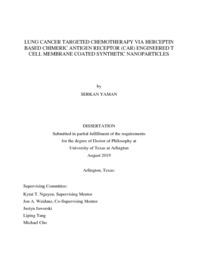
ATTENTION: The works hosted here are being migrated to a new repository that will consolidate resources, improve discoverability, and better show UTA's research impact on the global community. We will update authors as the migration progresses. Please see MavMatrix for more information.
Show simple item record
| dc.contributor.advisor | Nguyen, Kytai T. | |
| dc.contributor.advisor | Weidanz, Jon A. | |
| dc.creator | Yaman, Serkan | |
| dc.date.accessioned | 2022-02-10T18:14:50Z | |
| dc.date.available | 2022-02-10T18:14:50Z | |
| dc.date.created | 2019-08 | |
| dc.date.issued | 2019-08-21 | |
| dc.date.submitted | August 2019 | |
| dc.identifier.uri | http://hdl.handle.net/10106/30267 | |
| dc.description.abstract | Cell membrane-derived nanoparticles recently caught attention due to their desirable features in drug delivery such as mimicking properties of native tissue and cells, avoiding systemic clearance, and alleviating foreign body responses. Besides nanoparticle technology, adoptive immunotherapy has emerged for its promising treatment modalities, including cancer specificity. Our long-term goal for this research is to develop a biomimetic drug carrier based on chimeric antigen receptor (CAR) transduced T cell membranes. In the study, anti-cancer drug afatinib loaded poly(D,L-lactide-co-glycolide) (PLGA) nanoparticles (NPs) co-extruded with anti her-2 based chimeric antigen receptor (CAR) Jurkat T cell membranes. Anti her-2 CAR-T cells were produced by lentiviral transduction of anti her-2 chimeric antigenic receptor coding lentiviral plasmids. Anti her-2 CAR-T cells were characterized by their specific activities against her-2 antigen and used for cell membrane extraction. Anti her-2 CAR-T cell membrane coated PLGA nanoparticles (CAR-T-MNPs) characterized via fluorescent microscopy and flow cytometry. Membrane coated NPs showed ustained drug release over the course of 21 days and were stable up to 5 days. Afatinib loaded CAR-T-MNPs inhibited growth of A549 lung cancer cells in vitro. In addition, in vitro uptake studies revealed that CAR-T-MNPs showed an increased uptake by A549 cells. This results also confirmed via in vivo biodistribution studies using subcutaneous lung cancer model in nude mice that, of all studied groups, CAR-T-MNPs localized more at tumor areas compared to those of other studied groups. Therefore, new CAR modified cell membrane coated NP drug-delivery platform has shown its efficacy in vitro and in vivo. Proposed CAR based NPs are promising biomimetic delivery with its long circulation time and tumor site accumulation while opening a new way to personalized medicine and tumor specific targeting by patient's own cell membrane coated NP delivery. | |
| dc.format.mimetype | application/pdf | |
| dc.language.iso | en_US | |
| dc.subject | Nanoparticles | |
| dc.subject | CAR-T cells | |
| dc.subject | membrane-based drug delivery | |
| dc.subject | cancer chemotherapy | |
| dc.title | LUNG CANCER TARGETED CHEMOTHERAPY VIA HERCEPTIN BASED CHIMERIC ANTIGEN RECEPTOR (CAR) ENGINEERED T CELL MEMBRANE COATED SYNTHETIC NANOPARTICLES | |
| dc.type | Thesis | |
| dc.degree.department | Bioengineering | |
| dc.degree.name | Doctor of Philosophy in Biomedical Engineering | |
| dc.date.updated | 2022-02-10T18:14:50Z | |
| thesis.degree.department | Bioengineering | |
| thesis.degree.grantor | The University of Texas at Arlington | |
| thesis.degree.level | Doctoral | |
| thesis.degree.name | Doctor of Philosophy in Biomedical Engineering | |
| dc.type.material | text | |
Files in this item
- Name:
- YAMAN-DISSERTATION-2019.pdf
- Size:
- 4.661Mb
- Format:
- PDF
This item appears in the following Collection(s)
Show simple item record


